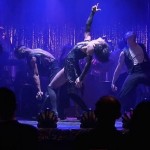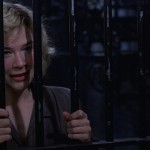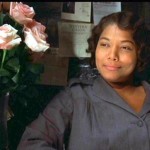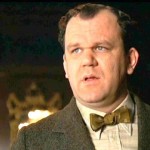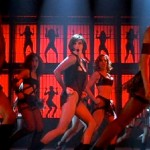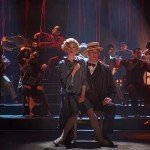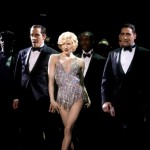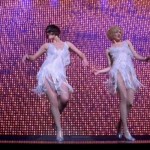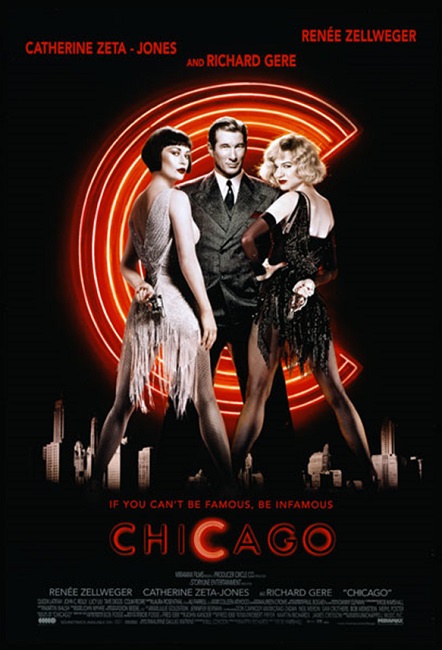
Chicago – 2002
It is nice to see that Hollywood can still appreciate a good musical. The last musical to win the coveted Best Picture award was Oliver! in 1968. Chicago surprised everyone on a number of levels. First, the fact that a musical could once again grab the brass ring was unexpected. Second, several actors that we all know and love proved that they could both sing and dance, which is unusual for most actors today. Third, the musical itself did not get the best reviews on Broadway.
The plot centers around the fictional characters of Roxie Hart, played by Renee Zellweger, and Velma Kelly, played by Catherine Zeta-Jones. They are loosely based on the real-life criminals Beulah Annan and Belva Gaertner. They were each murderesses in the Cook County Jail in Chicago, and most of the plot follows them as they await their trials. They have both hired Billy Flynn, the super-star lawyer who has never lost a case, played by Richard Gere. The corrupt warden of the Women’s prison is a woman who takes bribes in exchange for cigarettes and other contraband, Matron Mama Morton, played by Queen Latifah. Roxie’s husband Amos, played by John C. Reilly, is a weak willed man who everyone tends to either manipulate or ignore. That is the main cast, though other notable actors appear such as Christine Baransky, Tay Diggs, Lucy Liu, and Dominic West.
Interesting note: It is strongly implied, but never actually stated that Mama Morton also demands sexual favors from her inmates. Just listen to the lyrics for the song When You’re Good to Mama.
The story is so outrageous that it is actually fun, despite the dark nature of the subject matter. Velma is a nightclub performer who has murdered her husband and sister after catching them in bed together, “Doing number 17… the spread eagle.” (the number representing the 17th acrobatic stunt in her nightclub act.) Roxie is a woman who is unsatisfied with her mild-mannered husband and dreams of being a performer on the stage. She is having an affair with a man who promises to help her realize that dream, but she murders him when she finds out that he has lied to her just to get her in the sack. Both women end up in jail under the watchful eye of Matron Mama Morton.
They meet the other women on murderess row and learn their stories. Morton helps them by getting Billy Flynn to defend them in court. Richard Gere did a good job and was very believable as the amoral and slick lawyer who knows how to manipulate the press and the jury with equal skill and success. He had several musical numbers in which he gave very admirable performances.
That is the basic plot and the pace of the movie is fast enough to keep it interesting. Director Rob Marshall, who also happened to be the film’s choreographer, did a great job of using the medium of film to tell a story that was originally written for the stage. That is more a difficult task than it might seem. Certain things work on the stage that do not translate well onto the big screen, and vice-versa. For example, on the stage, scene changes and costume changes are not instantaneous and time must be allowed for these things to take place. But in movies, these things must happen instantaneously to maintain the flow and pacing of the narrative. Also, movies have the advantage of being able to switch back and forth between sets and costumes to enhance the story in ways that cannot be done on stage.
The movie actually won 6 Academy Awards after being nominated for 13. In addition to Best Picture, it took home Oscars for Best Art Direction, Best Film Editing, Best Sound Mixing, Best Costume Design, and Zeta-Jones won for Best Supporting Actress. However, Zellweger was nominated for Best Actress, Latifah was nominated for Best Supporting Actress, and Reilly was nominated for Best Supporting Actor.
For me, the real stand-out member of the cast was Zeta Jones. She was gorgeous, her singing was spot-on, and her dancing was incredible. Granted, she and Gere had a history of working on Broadway, as opposed to Zellweger and Latifah who did not. But Zeta-Jones really did such a fantastic job, far outshining her co-stars. She had some of the most difficult dancing in the film, and she executed her moves with the sexy style and ease that her character demanded.
After all, the show was written to be a dance musical. Bob Fosse, the famous choreographer, had worked with the show’s composer and its lyricist, John Kander and Fred Ebb on the original stage production. The show was specifically known for its very stylized dancing and look. The film had taken years getting from the stage to the screen, and unfortunately, Fosse died before that dream was realized. Rob Marshall took over the choreography, saying that he didn’t want to copy Fosse’s style, but he did want to pay tribute to it.
The result was perfectly executed and the dancing in the film was fantastic. The choreography was quite demanding of the actors. In fact, Richard Gere had to learn to tap-dance for the film. Zellweger had no dance experience at all and had to learn all her moves from scratch. But I found that to be pretty obvious.
And honestly, that brings me to the movie’s biggest fault, in my opinion. I didn’t like Zellweger that much. I have never found her to be a terribly attractive woman and when the plot demanded that the world fell in love with her because of her beauty and personality, I just didn’t buy it. I mean, I don’t want to assign too much significance to this than necessary, but she was very flat chested, which was very evident whenever she wasn’t facing the camera head-on. Sorry, Renee, I’m just calling this one like I see it. Not sexy. And her dancing seemed forced, especially when put next to Zeta-Jones, who’s dancing seemed easy and natural. Other than that, her acting was just fine. And, I have to admit, I enjoyed her singing. Her voice was especially good in the song Funny Honey.
In fact, the music in general was very well done. Kander and Ebb’s score was intended to reflect the Vaudeville music of the 1920s, the era when the show takes place. The score is a memorable one. Songs like All That Jazz, When You’re Good to Mama, Cell Block Tango, We Both Reached for the Gun, Mister Cellophane, Razzle Dazzle and Nowadays are all easy to sing along with and sit well in the ear. Kander and Ebb had already proven themselves with another hit musical, Cabaret, and Chicago just cemented their place in musical theatre history.
Interesting note: When Chicago originally opened on Broadway, the role of Roxie Hart was played by Gwen Verdon, Bob Fosse’s wife at the time. Five days before the show opened, she inhaled a feather from one of the costumes, causing her to have surgery on the nodes in her throat. The show was in danger of closing before it opened. However, Cabaret star Liza Minnelli stepped in, and after only 5 days of rehearsal, she performed the role until Verdon was able to take back her part.
One song in particular stands out to me as a great dance number that was incredibly well choreographed, masterfully danced, and wonderfully fun to listen to. It was also one of the darkest numbers in the whole show: Cell Block Tango. This is the song in which the murderesses tell their stories about the killings that landed them in the clink.
Now, in order to explain the genius of this, and several other numbers in the show, I have to explain the unique vision of the director, Rob Marshall. The key element that allowed the stage play to be made into a movie was the idea that all the musical numbers were told through Roxie’s perspective. She was portrayed as a woman whose greatest dream was to be a nightclub performer. So, when bad things happened, her mind went to her happy place: the stage.
Many of the songs used both her fantasy, which had the gowns, the glitter, the glamour and the dancing, and the “real world”, which made use of gritty reality, drab prison costumes, disheveled hair and iron bars. In Cell Block Tango, Marshall showed each woman in both lights. And the costumes and dancing in the fantasy was fantastic. Each woman, of which Velma was one, had on sexy black clothing that resembled bondage gear, giving them a dangerous look. As they told their stories, their deceased men appeared to dance with them in a tango, which in itself is a very erotic dance.
When each woman got to the part of her story in which she committed the murder, she would pull a red handkerchief out of a hidden place on her victim, corresponding to the particular death. The woman who stabbed her husband pulled it from his stomach. The woman who poisoned her husband pulled it from his mouth, and so on. This dance was very cleverly choreographed.
Interesting note: One of the murderesses is a Hungarian woman played by a Russian actress named Ekaterina Chtchelkanova. She tells her story in Hungarian, but I actually looked up the translation online, which reads as follows: “What am I doing here? They say my notorious lover held down my husband and I chopped his Head off. It’s untrue. I am innocent. I do not know why Uncle Sam says I did it. I tried to explain at the police station but they didn’t understand what I am saying.” I have always taken the position that she was innocent, just as she claimed, and that she was wrongfully executed. It is a nice contrast to the guilty women who are trying to prove their innocence.
And I can’t finish this review without giving a special honorable mention to John C. Reilly and his wonderful performance. He really understood that character he was playing. Amos was not too smart, but he did have feelings. He loved his wife and was willing to go to jail for her until he realized that she had been cheating on him. His big song, Mister Cellophane, was staged as a Vaudeville number. He was dressed to resemble Emmett Kelly’s character of the hobo clown, Weary Willie. The song was brilliantly performed. Great job, Reilly!
Interesting note: There was a wonderful song called Class that was filmed but ultimately cut from the film. It was a crass duet between Mama Morton and Velma Kelly, as they complain that nobody ain’t got no class no more… However, the song was included on the film’s soundtrack.
Chicago was a very good movie that was fun to watch. For me, Zeta-Jones really sold the movie, and it wouldn’t have been the same without her. Marshall’s directing choices and choreography were incredibly well done. This movie was a worthy winner of the Best Picture award in more ways than one.
